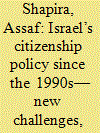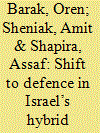| Srl | Item |
| 1 |
ID:
168627


|
|
|
|
|
| Summary/Abstract |
Israel’s highly restrictive citizenship policy constitutes the clearest indicator of its dominant ethnic model of citizenship. However, this policy has faced new challenges since the early 1990s, following the mass migration of non-Jewish immigrants. This paper examines and characterizes changes in immigrants’ entitlement to Israeli citizenship since the 1990s. It indicates that while Israel’s traditional citizenship policy has not undergone any significant change, two trends are evident: a much more restrictive policy towards Arab immigrants; and a somewhat more inclusive policy concerning other immigrants. To explain how these conflicting trends have coexisted, this study identifies three major characteristics of the Israeli policy: widespread use of the ‘divide and rule’ technique; managing policy through bureaucratic decisions; and the growing assimilation of liberal and republican principles into Israel’s citizenship policy, although without undermining—on the contrary, even reinforcing—the dominant ethnic model of citizenship. These findings indicate that although the dominant ethnic citizenship model in Israel remains stable, and can successfully tackle significant obstacles, limited opportunities exist for greater inclusion of specific non-Jewish populations within the Israeli polity.
|
|
|
|
|
|
|
|
|
|
|
|
|
|
|
|
| 2 |
ID:
193163


|
|
|
|
|
| Summary/Abstract |
This paper traces the significant change that has occurred in the balance between offense and defence in Israel’s ‘hybrid’ military strategy in recent decades. Relying on fresh materials concerning the organizational, doctrinal, and procurement processes of Israel’s military, we identify a shift from offense towards defence as the preferred way to protect Israel in the face of new security threats. We also show that due to rapidly changing security challenges, limited resources, and the military’s organizational culture, this change has been gradual, incremental, improvised, and largely informal. We propose that similar changes may characterize other states facing new security challenges.
|
|
|
|
|
|
|
|
|
|
|
|
|
|
|
|